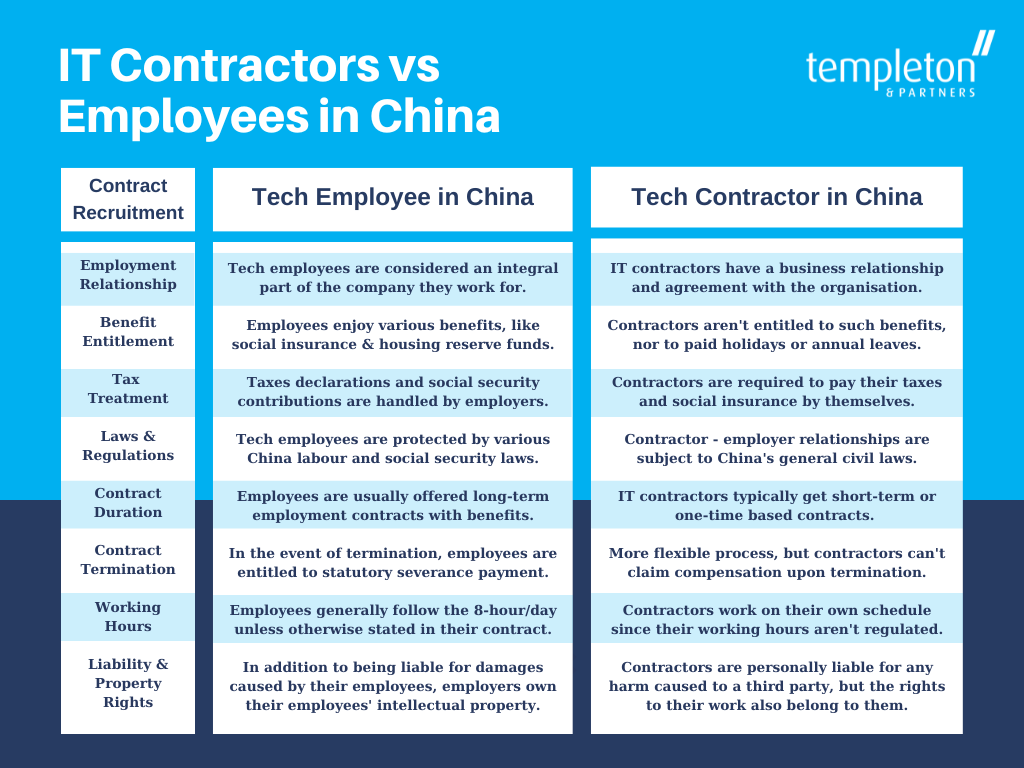China's tech market has grown exponentially in recent years, with investments in artificial intelligence, big data, and cloud computing driving the industry's rapid expansion. With a growing economy and an emphasis on innovation, China has become a hub for tech startups and global tech giants, creating a high demand for skilled professionals. As a result, IT contractors have become increasingly valuable, offering specialised skills and expertise to companies looking to stay ahead of the curve.

As China continues to make waves in the global tech industry, the opportunities for tech contractors are booming. Companies often prefer to hire independent contractors instead of employees when seeking to limit costs and liability. Although this trend is particularly popular in the IT sector, and working as an independent tech contractor is generally allowed under PCR law, navigating China's legal framework can be quite complex and daunting, discouraging many from considering this employment model.
Apart from the complicated legal framework, several myths surrounding independent contracting in China deter many IT professionals from pursuing this type of employment. These myths include beliefs like it is illegal, suitable only for low-level work, not financially viable, too risky, or not a legitimate long-term career option.
|
The State of Tech and Contractual Employment in China Categories of Workers in China What Is an Independent IT Contractor |
This article aims to delve into the opportunities available for tech contractors in China, provide insights into what it is like to work as a tech contractor in the country and dispel the myths and misconceptions surrounding independent contracting in the Chinese tech industry.
The State of Tech and Contractual Employment in China
China has emerged as a global technology powerhouse in recent years, with a rapidly growing tech industry and a huge pool of tech talent. The Chinese IT market is the fourth largest around the globe, both in terms of consumer spending and business investment. The country is home to several major tech companies, such as Alibaba, Tencent, Baidu, and Huawei, and has a thriving startup ecosystem. In 2020, China was ranked second in the world for the number of unicorns (privately held tech startups with a valuation of over $1 billion), trailing only the United States. The Chinese government has also been actively promoting the tech industry’s development and has implemented policies to support entrepreneurship and innovation.
In terms of tech employment, China is a major hub for IT talent. However, due to the increasing demand for skilled professionals to foster innovation and growth, many companies are turning towards hiring independent contractors to limit costs and liability. Moreover, the Chinese labour market is expected to decrease slightly in the next decade because of an ageing population and the one-child policy, resulting in a further rise in demand for skilled contractors in the IT and tech sectors.
Before the pandemic, the computer science and software industry experienced a 9% increase in wages, which was the highest rise in pay across all industries in China. This created favourable conditions for many skilled IT contractors to undertake profitable assignments. In the aftermath of the pandemic, many ΙΤ professionals realised that contract roles offer not only financial benefits but also greater flexibility and freedom. According to McKinsey, the pandemic accelerated the existing trend of remote and contractual work, as technology and rapid globalisation brought unprecedented changes in personal and professional life. There is a greater emphasis now on work/life balance, making contract roles more appealing to IT professionals seeking more flexibility and autonomy.
Today, China’s most in-demand IT roles include data scientists, automation and robotics experts, AI professionals, DevOps engineers, cybersecurity experts, front-end engineers, and developers proficient in Java and Python.
As a world-leading hub for technological innovation and an increasingly competitive player across industries and markets, with greater investments in education, business and economy, China is continually enhancing its status as an ideal location for short-term employment. However, the complexities and misconceptions around independent contracting in tech are still keeping many from reaping the benefits of this type of employment.
Categories of Workers in China
Under PRC (People's Republic of China) employment laws, there are two main categories of workers: employees/workers and independent contractors/self-employed.
Employees/workers have a de facto employment relationship with a company and are subject to the company's internal rules and regulations. They receive a salary and social insurance contributions from the company and are under the company's control and direction. The services provided by employees fall within the company's core business.
On the other hand, independent contractors/self-employed workers are not directly employed by a company but are contracted to provide specific services for a project or time period. They are not subject to the company's internal rules and regulations, do not receive salary or social insurance contributions from the company, and are not under the company's control and direction.
In China, workers must be directly employed by a company, whether in a standard employer-employee relationship, through a PEO/EOR such as INS Global, or as an employee of their own legal entity. Companies in China are expected to manage all areas of an employee's tax and social security contributions and provide employee benefits in line with national labour law. However, they do not need to arrange these for independent contractors. Establishing the correct relationship with independent contractors is important to avoid legal problems.

What Is an Independent Contractor in China
In China, an independent IT contractor is a self-employed individual or entity that provides temporary services to an organisation or company under the terms of a business or service contract. An independent contractor is not considered an employee of the company, which means they are not entitled to the same benefits regular employees receive, such as social security, healthcare insurance, and retirement contributions.
Any company that plans to hire independent tech contractors has to outsource the personnel from a third-party registered for that service, such as a PEO service or dispatching agent. This is because Chinese law requires a worker to be directly employed by a company, whether in a standard employer-employee relationship or as an employee of their own legal entity.
Being an independent contractor or freelancer in China, particularly in the tech sector, can be advantageous as it offers more flexibility and autonomy in terms of work and income. However, if the processes to establish this relationship are not followed correctly, it may bring legal issues for both the contractor and the company.
Employees vs Independent Contractors: Understanding the Differences
Here are the main differences between independent contractors and full-time employees in China.
-
Differences in Employment Relationship
The distinction between employees and independent contractors in China extends beyond their titles, ultimately resulting in different legal requirements, benefits, and interactions with the employer. While employees are considered a part of the registered company, independent contractors have a business relationship and agreement with the organisation.
Full-time employees in China are generally entitled to a range of benefits and protections under the country's labour laws, designed to provide them with a level of protection. On the other hand, independent contractors are considered self-employed individuals. While they may enjoy greater flexibility and control over their work arrangements, they are also responsible for their own taxes, insurance, and other expenses.
In general, the key factor regarding the distinction between employees and contractors in China is the level of control that the employer has over the worker. If the employer has significant control over the worker's work arrangements, they are likely to be classified as an employee. In contrast, if the worker has more independence and autonomy, they are considered contractors.
-
Differences in Benefit Entitlement
Employees in China are entitled to various statutory benefits such as social insurance contributions (including pension insurance, medical insurance, work-related insurance, maternity insurance, and unemployment insurance) and housing reserve fund, which employers must contribute to in accordance with national laws and local regulations. They are also entitled to a range of paid leaves, including annual, marriage, maternity, paternity, work-related injury, and sick leave. Employers are required to provide at least the mandatory minimum benefits as per national laws and local regulations.
Independent contractors, however, are not entitled to these benefits. They often work according to their own schedule and are paid by project completion, meaning they do not have the benefit of paid annual leave or public holidays. Moreover, they are responsible for making their own contributions to the social security system and ensuring they comply with the labour laws to receive the appropriate benefits and protections.
-
Differences in Tax Treatment
Both employees and contractors are subject to individual income tax (IIT) on their wages and earnings according to the tax laws of China. In the case of employees, employers are responsible for withholding and declaring their employees' income tax on a monthly basis, while independent contractors should declare their income tax themselves on a yearly basis.
Since independent contractors and freelance workers are considered to be in business for themselves, they are required to keep accurate records of their business income and expenses and pay their taxes themselves on a timely basis. In some cases, they may also need to register for value-added tax (VAT) in addition to IIT. When it comes to filing IIT returns, contractors need to calculate their taxable income by subtracting legitimate business expenses from their gross income. They may also be eligible for tax deductions or credits that can reduce their tax liability.

-
Differences in Laws and Regulations
There are notable differences in the legislation applied to contractors and employees in China. While employees enjoy the protection of various labour and social security laws (including but not limited to Labour Law, Labour Contract Law, Social Insurance Law, and Trade Union Law), the contract for service between employers and independent contractors is subject to Civil Law and the Contract Law, observing the principle of autonomy of will.
In other words, according to PRC laws, the disputes between employers and personal labour services providers (contractors and freelancers) are not considered employment issues and, therefore, fall under the laws that regulate general civil legal relationships.
-
Differences in Contract Duration and Termination
Typically, employees are offered long-term employment contracts. In several cases, the employer and employee can mutually agree to execute a fixed-term employment contract. However, even in these situations, employees are entitled to statutory benefits, such as social insurance and housing funds, as well as statutory severance pay in the event of termination.
On the other hand, independent contractors usually receive short-term, often one-time-only contracts. The contract’s duration is freely agreed upon by both parties and is often determined by the completion of a specific task. The termination of the contract of services is also based on mutually agreed conditions, allowing for a relatively more flexible process. However, contractors can claim compensation upon termination without cause only if losses breach the contract or law.
-
Differences in Working Hours, Liability, and Property Rights
In China, full-time employees are generally required to follow the 8-hour workday unless otherwise stated in their contract. However, there are no specific working hour requirements for independent contractors, allowing them to work freely on their preferred schedule.
Another key difference between employees and independent contractors pertains to liability. In the case of employees, their employer is responsible for any harm or damage caused to a third party as a result of their job duties. On the other hand, the liability of independent contractors may vary depending on the type of contract. For instance, according to Chinese law, a contractor is personally liable for any injury caused to a third party while performing work unless the hirer was negligent in respect of its order, instruction or selection of contractors.
Finally, companies typically own the product and intellectual property created by their full-time employees, while independent contractors own the rights to their work unless otherwise stated in their contract.

Discover more – Contractor vs Freelancer vs Full-Time Employee: Pros and Cons
The Truth of Being a Tech Contractor in China
There are several misconceptions surrounding the concept of working as an independent tech contractor in China that may deter IT professionals from choosing this type of employment. Here are some of the most common myths and facts about what it means to be an IT contractor in China:
-
Myth – It is illegal to work as a contractor in China / There are no laws protecting independent contractors.
Reality: Being an independent contractor in China is not only legal but also a quite popular option for many professionals, especially in industries like hospitality, consumer products sales, and IT.
While there is no specific concept of "independent contractor" under China's labour laws, an individual can enter into a contract for service with a company or business under certain conditions, and both parties are equal and independent civil subjects without subordinate relationships. The contract for service with an independent contractor is subject to Civil Law and Contract Law, which are more flexible in the conclusion and termination of contracts than labour laws.
Particularly under the Contract Law, which sets out the rights and obligations of both parties in a contractual relationship, contractors have the right to negotiate their own terms and conditions of work, including their fees and work schedules. However, they do not enjoy the same benefits and protections as full-time employees, such as social security benefits, paid time off, and severance pay.
Moreover, there are no limitations on hiring independent contractors. Employers, however, are banned from using employees as nominal independent contractors (employment misclassification) to avoid their employer liabilities under PRC labour laws.
On the other hand, independent contractors should also be aware of their rights and obligations under the law, as well as the potential risks and benefits of this type of work arrangement. Additionally, they should comply with all relevant laws and regulations, such as registering their businesses and obtaining necessary licenses and permits to operate legally, pay taxes, and comply with all relevant labour laws and regulations.
-
Myth – There aren’t many contracting opportunities for IT professionals in China.
Reality: From a growing demand for online education, digital healthcare, e-commerce and cloud infrastructure, the digital technology sector in China saw significant expansion after the pandemic crisis. While it further strained the sector’s severely candidate short market, it has also created opportunities as more companies broaden their requirements to consider candidates from different backgrounds.
The current market conditions have created a golden opportunity for IT contract workers. Not only is their popularity growing, but they also have more leverage to negotiate better contract terms and payments amidst the talent shortage. Furthermore, as new and emerging technologies continue to shape the job market, there will be an increasing demand for expert IT skills in the coming years, creating even more opportunities for senior tech professionals who increasingly opt for contract positions.
One of the most prominent emerging technologies set to shape the Chinese tech ecosystem is artificial intelligence (AI). With an increasing number of companies in the country seeking AI-driven solutions to stay competitive, the demand for skilled workers in machine learning, natural language processing, and robotics is expected to skyrocket. This trend is expected to persist in the long term, as the Chinese government has set ambitious objectives for the country to become a global leader in AI by 2030.
Other skill sets and roles that are expected to be in high demand in China in 2023 and beyond include:
- digital marketing
- e-commerce
- cybersecurity
- developers across the board
- software engineers
- cloud computing
- blockchain
- big data and processors
Overall, for those in the tech contractual job market, now is a great time to turn uncertainty into opportunity.

-
Myth – It is not a legitimate career / There are more benefits for full-time employees.
Reality: In China, there is a perception that working as a contractor is less prestigious than having a full-time job, with many still considering independent contracting as a temporary or transitional career rather than a legitimate and sustainable career path. However, this notion is not entirely accurate, as independent contracting can be a valid and long-term career choice for many IT professionals. The misconception that independent contracting is only suitable for low-level or menial work is also incorrect, as contractors can work on a range of high-level and specialised projects in the tech industry.
When it comes to benefits, while it is true that contractors don’t receive some of the perks full-time employees enjoy, such as a stable income, health insurance, retirement plans, paid time off, and bonuses, being a contractor comes with its own unique set of advantages that outweigh these drawbacks.
The main benefit of contractual work is flexibility and better work-life balance. Unlike full-time employees, contractors have the convenience of managing their own schedules, working from anywhere they choose, and taking time off when they choose. Along with the flexibility, there are several other benefits to working as an IT contractor, whether in China or elsewhere:
- The opportunity to work in many different industries and types of jobs until finding the one that fits your career passion.
- Acquiring knowledge while keeping doors open for more employment opportunities.
- Gaining different skills in a short period of time.
- Building a larger professional network when working in several contract positions.
- Being your own boss.
In addition, the interview and hiring process for contract positions is generally faster than for permanent roles, which is also an important factor to consider.
-
Myth – Working as a tech contractor is not profitable.
Reality: Contrary to what some people believe, working as an independent tech contractor in China can be a lucrative and financially stable career choice. Independent contractors can earn competitive rates and have the potential to earn more than traditional employees, especially if they hold senior positions or have specialised skills that are in high demand.
The hourly rate for IT contractors in China can range from 200 to 500 CNY per hour, which is equivalent to approximately 25 to 60 GBP per hour. This estimate, however, is dependent on factors such as the contractor's skills, level of experience, type of project, location, and industry. Nevertheless, contractors are known to earn more than full-time tech employees due to the temporary and project-based nature of their work.
While contractors are responsible for their own taxes, insurance, and benefits, which can add to their expenses, they also have three significant advantages that enable them to earn more money than traditional employees. Firstly, they typically charge more than their counterparts, making it possible for them to earn higher salaries. Secondly, contractors can deduct their expenses, which helps them minimise their tax liability and ultimately maximises their earnings. Thirdly, they can work for multiple clients simultaneously, allowing them to earn multiple streams of income.
Moreover, IT contractors in China can also work remotely for companies in other countries that pay more, which is an additional advantage.
-
You can’t work as an IT contractor in China for a foreign/international company.
Reality: This myth couldn't be further from the truth. Working as an IT contractor in China for a foreign/international company is not only possible but also a popular option. In recent years, there has been an increase in demand for skilled IT contractors who can work remotely for companies located in other countries, and China is no exception.
One of the advantages of working as an IT contractor for a foreign company is the speed of onboarding talent, taking only days instead of weeks or months. Moreover, both contractors and companies have more flexibility, and potential misclassification of the worker can be avoided as contractors will work remotely. Chinese professionals with strong technical skills can take advantage of this opportunity, working with clients from different parts of the world and potentially earning higher rates of pay than they might receive for working on local projects.
Another misconception is that Chinese tech contractors need a visa to conduct business with a foreign company, even if they agree to work remotely from their home country. Generally, this is not true, except for some occasions, such as if they have agreed by contract to travel to the country of the company that employs them for a short period. Depending on the country they are visiting, they might need either a visitor visa or a business visa to secure entry clearance. They might also need a work visa if they want to relocate to the home country of the business that contractually employs them.
In any other case, IT contractors in China would need to comply with local regulations and obtain any necessary permits or approvals, whether they work for a foreign or a company based in China. This includes registering with the local tax authorities and obtaining a tax ID number. They also need to ensure they have the necessary equipment and software to work remotely and communicate effectively with their clients.
While it is illegal for companies to hire independent contractors based in China without an established Chinese legal entity, this hiring can be conducted through an agency or any third party unless the foreign company has a legal entity in China.
It is important for employers to be aware that if they don't have a legal entity in the country, hiring independent contractors based in China must be conducted through an agency or any third party.

Find Your Next IT Contracting Role With Us
For more than 26 years, Templeton’s tech recruitment experts have placed Developers, Engineers, Programmes and Technicians into roles across 40 countries.
Our China team has an extensive history of finding jobs for candidates across the country, ideally positioning us to help you in your next career move. Get in touch with us today!
You might also be interested in – Myths vs Facts: Career as an IT Contractor in India




